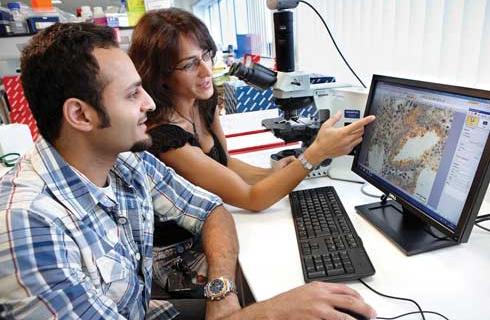Doctor of Philosophy in Psychology - Social Psychology

学历文凭
Ph.D.

专业院系
社会心理学

开学时间

课程时长

课程学费

国际学生入学条件
A master’s degree with a GPA of 3.0 or better
All international applicants are required to submit one transcript or academic record from each institution of higher education attended, including any study abroad or exchange programs, summer programs, and non-degree work and extension programs. Applicants may submit unofficial copies of transcripts while applying for admission. However, admitted students are required to submit official transcripts in order to enroll at UHM. Official transcripts or academic records must be sent to Graduate Division Student Services directly from the issuing institution(s), or in sealed institutional envelopes if submitted with the application.
Applicants are required to submit one transcript from each post-secondary institution attended, including any study abroad or exchange programs, summer programs, and non-degree work and extension programs. Applicants may submit unofficial copies of transcripts while applying for admission. However, admitted students are required to submit official transcripts in order to enroll at UHM.
TOEFL iBT - Minimum score 61 TOEFL iBT
IELTS- Minimum score is 6.00 for the IELTS Academic overall band test results. PBT 500
IDP—雅思考试联合主办方

雅思考试总分
6.0
了解更多
- 雅思总分:6
- 托福网考总分:61
- 托福笔试总分:500
- 其他语言考试:NA
CRICOS代码:
申请截止日期:请 与IDP联系 以获取详细信息。
课程简介
The Cognition, Neuroscience, & Social (CNS) program conducts cutting edge research on human behavior that ranges from the level of cells to society, exploring the mechanisms of brain and behavior within social contexts. To explore many of the fascinating questions in these areas, faculty members and graduate students use a variety of experimental approaches such as behavioral studies, psychophysics, computational models, eye-tracking and motion tracking in virtual reality, electroencephalography (EEG), functional Magnetic Resonance Imaging (fMRI), as well as developmental, genetic, and animal research approaches. CNS graduate students receive interdisciplinary training across the three areas, and participate and lead ongoing and novel research projects. Generally, students are mentored by a faculty member with expertise in either cognition, neuroscience, or social psychology, although across discipline research and mentorship is available. The CNS program is comprised of faculty members conducting research in the following areas:<br>Social: This is the branch of psychology that studies individuals in the social context. It explores how and why people think, feel, and do the things they do depending upon the situation they are in. Our current research focuses on generating and testing theories of social behavior that aim to illuminate many aspects of the human experience, including interpersonal relationships, prejudice and stereotyping, person perception, biases in judgment, emotion, cultural influences in thinking, helping and aggression, identity and the self, and attitudes and persuasion.
相关申请

预科

奖学金

实习机会

在校学习

跨境学习

校园授课-线上开始

在线/远程学习
学校排名
世界排名
201
数据源:泰晤士高等教育世界大学排名
本校相关课程
Master of Science in Zoology

学历文凭
Masters Degree
下一个开始日期
课程费用总额
Master of Urban and Regional Planning

学历文凭
Masters Degree
下一个开始日期
课程费用总额
Master of Science in Tropical Plant Pathology

学历文凭
Masters Degree
下一个开始日期
课程费用总额
Master of Science in Tropical Plant and Soil Sciences

学历文凭
Masters Degree
下一个开始日期
课程费用总额
Master of Science in Travel Industry Management

学历文凭
Masters Degree
下一个开始日期
课程费用总额
Master of Fine Arts in Theatre

学历文凭
Masters Degree
下一个开始日期
课程费用总额
其他相关课程
社会人格心理学心理学博士

纽约州立大学奥尔巴尼分校
泰晤士高等教育世界大学排名:

学历文凭
Ph.D.
下一个开始日期
课程费用总额
Doctor of Philosophy in Psychology - Social Psychology

夏威夷大学马诺阿分校
泰晤士高等教育世界大学排名:

学历文凭
Ph.D.
下一个开始日期
课程费用总额
Doctor of Philosophy in Psychology - Social Psychology

犹他大学
泰晤士高等教育世界大学排名:246

学历文凭
Ph.D.
下一个开始日期
课程费用总额
社会心理学哲学博士

哈佛大学
泰晤士高等教育世界大学排名:5

学历文凭
Ph.D.
下一个开始日期
课程费用总额
心理学科学学士-社会与人格

康奈尔大学
泰晤士高等教育世界大学排名:18

学历文凭
Bachelor Degree
下一个开始日期
课程费用总额
社会学哲学博士-社会心理学

马里兰大学帕克分校
泰晤士高等教育世界大学排名:

学历文凭
Ph.D.
下一个开始日期
课程费用总额




